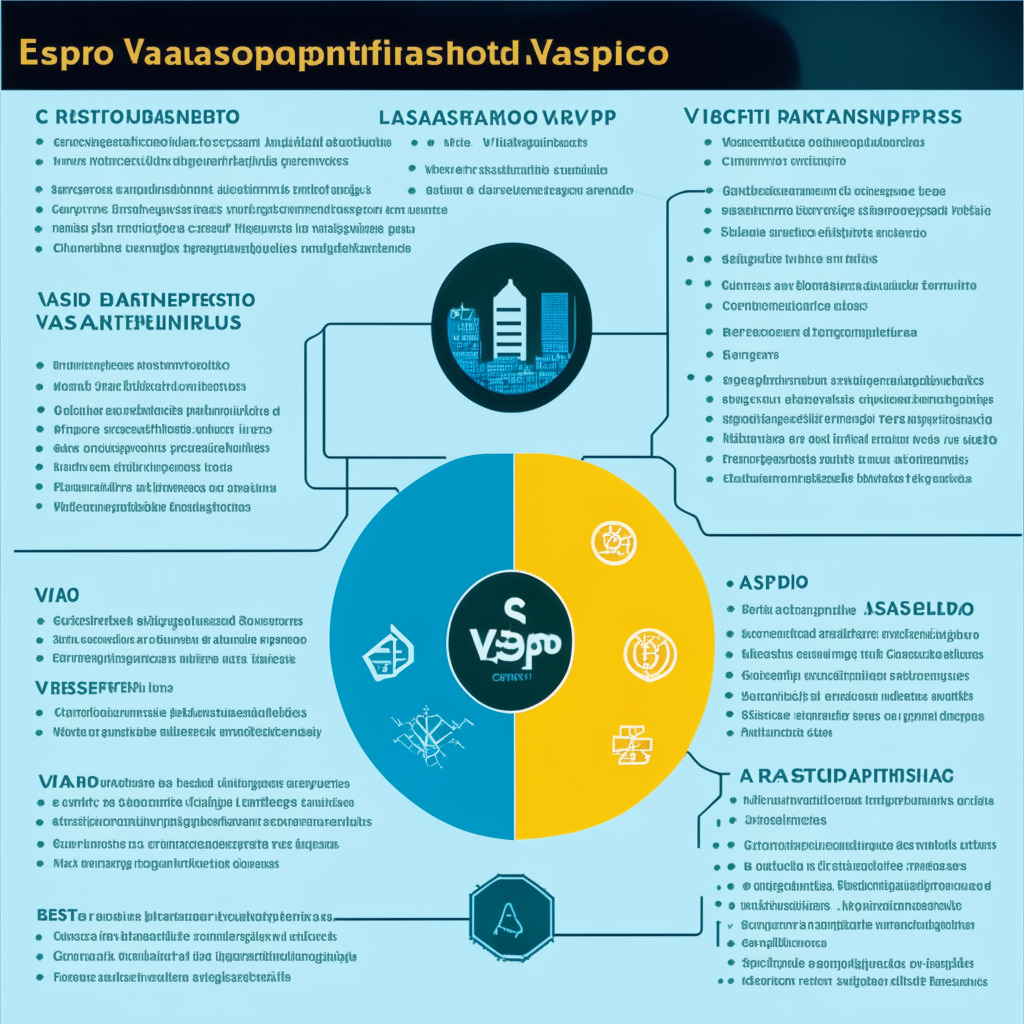Taiwan’s Financial Supervisory Commission (FSC) is implementing new regulations to improve safeguards for crypto investors. These regulations seek to control virtual asset service providers (VASPs) like Binance, Kraken, and ByBit, emphasizing asset safety, self-regulation, and legal operation in Taiwan. This overhaul coincides with local exchanges forming a regulatory body, and precedes FSC’s expected 2023 takeover as Taiwan’s primary crypto regulator.
Search Results for: VASP
Hong Kong Crypto Firms Invest Heavily in VASP Licenses: Balancing Compliance and Innovation
Web3 firms in Hong Kong are spending substantial amounts to obtain Virtual Asset Licensing Regime (VASP) licenses, highlighting the industry’s commitment to compliance and regulation. However, high licensing costs may deter smaller firms from entering the market, potentially stifling innovation and limiting competition in blockchain and cryptocurrency sectors.
Crypto.com Gains VASP Registration in Spain: Analyzing Benefits and Drawbacks
Crypto.com received a Virtual Asset Service Provider (VASP) registration from the Bank of Spain, enabling it to offer products and services in the country. This milestone follows a compliance review with Anti-Money Laundering Directive (AMLD) and other financial crimes laws required for MiCA-based VASP licenses. Increased regulations anticipate a more transparent, trustworthy, and robust crypto market.
Crypto.com VASP Approval: Balancing Innovation and Regulation in the Crypto Space
Crypto.com acquired registration as a virtual asset service provider (VASP) with the Bank of Spain, allowing it to offer products and services to users in Spain. The EU’s new MiCA framework raises both legitimacy and regulation concerns for the crypto industry’s growth and innovation.
Crypto.Com’s VASP License in Spain: Analyzing Regulatory Inconsistencies and Market Implications
Crypto.Com has obtained a Virtual Asset Service Provider (VASP) license from the Bank of Spain, indicating progress towards a regulated environment for digital assets in Europe. However, inconsistencies in regulatory treatment of exchanges like Binance raise concerns about uneven application of rules and impacts on market stability and adoption.
UK FCA Nods Komainu for Crypto Custody: Milestone or Bureaucratic Nightmare?
“Komainu, a digital asset custody service, has been authorized by the UK Financial Conduct Authority (FCA) to operate within the bounds of laws concerning money laundering and related funds transfer. This enables them to offer a range of cryptocurrency custody services across the UK, highlighting the growing acceptance of digital assets globally.”
Kraken’s Acquisition of Dutch Crypto Exchange: A Strategic Masterstroke or a Risky Gamble?
“The US-based exchange Kraken plans to acquire Dutch cryptocurrency exchange Coin Meester B.V. (BCM), aiming for European expansion and leveraging the EU’s MiCA regulatory framework. This ambitious move, though promising high cryptocurrency adoption, may lead to greater regulatory scrutiny and operational complexities.”
Bold Move or Risky Undertaking? Kraken’s Proposed Venture into Traditional Markets
“Kraken, a leading US-based cryptocurrency exchange, is reportedly planning to venture into traditional stocks and ETFs. This new venture, named Kraken Securities, is waiting for regulatory approvals. Its expansion, however, comes with regulatory scrutiny and privacy infringements, raising questions about harmonizing privacy rights, regulatory requirements and business strategies.”
Hong Kong’s Controversial Stance on Crypto: Safety Measures or Hindrance to Mass Adoption?
“Hong Kong-based crypto exchange Hashkey HK has started trading Avalanche (AVAX) but with a specific condition – only professional investors with a portfolio exceeding $1 million can trade AVAX. Hashkey HK mandates users deposit $1,500 for KYC verification.”
Taiwan’s Crypto Sector Shake-Up: Empowering Security and Trust Through New FSC Regulations
Taiwan’s Financial Supervisory Commission (FSC) introduces fresh directives for Virtual Asset Service Providers (VASPs) to improve cryptocurrency users’ security. Guidelines demand a clear separation of company and customer assets, increased transparency, fortified internal controls within crypto firms, and adherence to robust anti-money laundering mechanisms. These regulations aim to encourage self-regulation in the crypto industry.
Kraken’s Expansion in Europe: Spearheading the Crypto Revolution with Key Regulatory Approvals
Crypto exchange Kraken has secured regulatory approvals in Spain and Ireland, furthering its expansion plans in Europe. With a Virtual Asset Service Provider license and an EU e-money license, Kraken will provide digital asset exchange and custodial wallet services.Investment into regulatory framework positions Europe as a promising arena for crypto growth.
Kraken’s Regulatory Triumph and Tussle: A Tale of Two Crypto Jurisdictions
“Kraken, a major crypto exchange, recently received Electronic Money Institution and Virtual Asset Service Provider registrations in Ireland and Spain, marking progress towards crypto acceptance in Europe. However, it faces controversy with Australian regulators, highlighting the careful balance required in this evolving industry.”
Emergence of Taiwan’s Crypto Association: A New Era for Global Currency Adoption
Taiwan’s crypto community is set to establish an operational group this October, designed to facilitate digital currency adoption and self-compliance. Spearheaded by nine local cryptocurrency exchanges, this initiative aims to foster a healthy industrial environment and ensure the industry’s robust wellbeing, ultimately propelling Taiwan onto the global cryptocurrency stage.
Taiwan’s Crypto Exchanges Unite Under New Association Amid Regulatory Changes
“Major Taiwan crypto exchanges have initiated the Taiwan Virtual Asset Platform and Transaction Business Association in response to impending regulations. It provides industry direction, consensus building, and representation and also rallies diverse stakeholders in the volatile crypto market. This appears as a progress towards the industry’s maturity.”
Coinbase’s AML Registration in Spain: Catalyst for Crypto Influence or Regulatory Dilemma?
Coinbase has obtained an Anti-Money Laundering compliance registration from the Bank of Spain, marking an expansion of its influence in Europe. The cryptocurrency exchange can now offer its products to users in Spain, adhering to local legal frameworks. Also, similar approvals have been received in Italy, Ireland, Netherlands, Singapore, Brazil, and Canada.
Coinbase Obtain AML Compliance in Spain: Striking Balance between Global Expansion and Regulatory Challenges
Coinbase has secured an Anti-Money Laundering compliance registration from Spain’s central bank, enabling crypto services in the country. As Coinbase expands globally, it faces possible complications from varying regulatory frameworks and is urged to prioritize asset security as skeptical holders consider withdrawing assets.
Mauve: A New Dawn in Decentralized Exchanges and Tokenized Real-World Assets
“Mauve, a decentralized exchange, is among the first non-custodial exchanges legitimized as a virtual asset service provider by the Cayman Islands Monetary Authority. The exchange aims to trade compliant, real world assets, thus opening up avenues for secondary markets for on-chain real-world assets such as fixed income securities.”
Navigating Taiwan’s Unfolding Crypto Regulation: Certainty or Stifling Innovation?
“Taiwan is crafting restrictions for offshore cryptocurrency exchanges operating within its domains. The Financial Supervisory Commission (FSC) is formulating a guidebook to help virtual asset services providers establish regulatory norms, focusing on information disclosure, virtual asset listing standards, and secure division of corporate and customer assets.”
Hong Kong’s Digital Yuan Testing Phase II: A Leap to Future or a Threat to Privacy?
“Hong Kong is advancing on the second phase of technical testing for China’s digital yuan, focusing on the digital wallet’s top-up functionality via the Faster Payment System. Concomitantly, the city grapples with challenges balancing financial innovation and consumer protection in the fast-paced digital currency landscape.”
Taiwan’s Crypto Regulation Tightrope: Balancing Innovation and Security
“Taiwan drafts guidelines to regulate unregistered foreign virtual asset service providers (VASPs). The Financial Supervisory Commission (FSC) produced a draft of ten principles, aiming to protect the market from abusive practices while promoting transparency and differentiating custody of assets.”
UK’s New Crypto Rules: Balancing Financial Security and Innovation
The UK’s Financial Conduct Authority now requires Virtual Asset Service Providers to gather and validate information on crypto transactions, even beyond local jurisdiction. This regulation, known as the Travel Rule, aims to counter money laundering and terrorist financing, yet raises concerns regarding privacy and curbing innovation within the growing crypto industry.
Hong Kong’s Crypto-Friendly Landscape: OKX Eyes Regulatory License & Emerging Market Dynamics
OKX, a digital asset exchange, seeks to acquire a Virtual Asset Service Provider License (VASP) amid Hong Kong’s crypto-friendly environment. With full licenses already granted to HashKey and OSL, OKX intends to onboard 100,000 to 200,000 users in its initial year of trading services. The city’s progressive stance toward crypto could position it as a “test net” for mainland China following China’s total crypto ban.
Soccer Legend Ronaldo’s NFT Gameplan Vs The Regulatory Framework of Crypto Markets
“Soccer legend Cristiano Ronaldo, an early adopter of NFTs, recently revealed his future plans for more NFT collections through a lie detector experience. As crypto markets evolve, sports stars like Ronaldo are actively participating, but it’s crucial for individuals and corporations to tread cautiously.”
UK’s Implementation of the Crypto Travel Rule: A Double-Edged Sword?
The UK’s recent implementation of the ‘Travel Rule’ for crypto transactions aims to deter anti-money laundering and counter-terrorist financing on-chain. This rule requires UK-based virtual-asset service providers to collect, verify, and share information about crypto-asset transfers, even from overseas jurisdictions.
Innovative Partnerships: How Crypto is Paving the Way to Luxury Real Estate
Cryptocurrency lender, Ledn, partnered with Cayman’s top crypto real estate broker, Parallel, unlocking opportunities for crypto investors to purchase Cayman real estate. The partnership opens doors to “Golden Visa” eligibility without requiring traditional currency conversion or selling of digital assets. This initiative is an exciting opportunity to blend digital asset ownership with real estate investment.
UK Crypto Regulations Pinch But Promise Market Integrity: The FATF Travel Rule Unpacked
Starting September 1, UK crypto businesses will follow the Financial Action Task Force’s Anti-Money Laundering and Counter-Terrorist Financing regulations, including the ‘Travel Rule’. This may increase operations and marketing costs, but aims to prevent fraud and enhance customer protection in the crypto market.
Stellar Foundation’s Unprecedented Investment in MoneyGram: A Leap or a Stumble?
Stellar Development Foundation becomes a minority investor in MoneyGram International, deviating from the norm. ZetaChain closes an equity funding round, aiming to simplify asset and data management across multiple blockchains. Adidas and BAPE merge fashion and NFTs.
Binance’s Regulatory Dance: A Look into Taiwan’s Evolving Crypto Landscape and AML Compliance Challenges
Binance, a leading cryptocurrency exchange, has applied for registration in Taiwan under the jurisdiction’s Money Laundering Control Act and Financial Supervisory Commission compliance. This aligns with Taiwan’s efforts to implement Anti-Money Laundering laws for virtual asset service providers amidst a developing regulatory environment.
Namibia Embraces Crypto Regulations: A Breakthrough or a Setback?
“Namibia has signed a law regulating Virtual Asset Service Providers, reversing its 2017 ban on crypto exchanges. The law aims to enhance consumer protection, curb market abuse, and mitigate money laundering and terrorism financing risks. However, severe penalties apply for non-compliance and cryptocurrencies still hold no legal tender status in Namibia, potentially creating a hostile environment for crypto businesses.”
Emerging Legislative Storm: Namibian Crypto Regulations and Their Potential Impact
Namibia’s National Assembly is taking steps towards regulating cryptocurrencies and their service providers, with penalties for non-compliance including a N$15 million fine or 10-years jail. The proposed legislation establishes a Regulatory Authority aimed at safeguarding consumer interests, preventing market manipulation and fostering innovation in virtual assets.
Striking the Balance: South Korea’s New Crypto Legislation, Investor Safety and Innovation Stifling Consequences
South Korea recently passed the ‘Virtual Asset User Protection’ legislation, a collection of 19 crypto-related bills aimed at safeguarding investors and addressing unfair trading in the cryptocurrency arena. This law also holds Virtual Asset Service Providers (VASPs) accountable for users’ deposits and insurance provisions, aimed at protecting against risks including hacks and computer failures.
Unveiling Slovakia’s New Crypto Tax Laws: An Opportunity or a Regulatory Gap?
Slovakia’s National Council has approved an amendment reducing taxation on cryptocurrencies. The personal income tax on crypto profits will drop to 7% from either 19% or 25%. Additionally, crypto payments under 2400 euros and crypto income won’t be subject to typical health insurance contributions.































